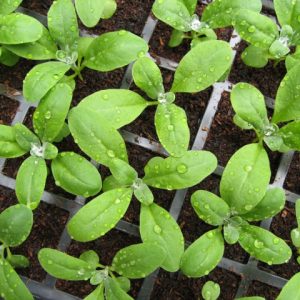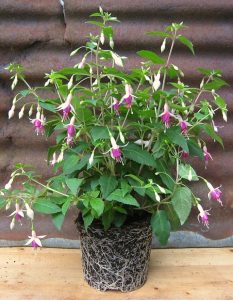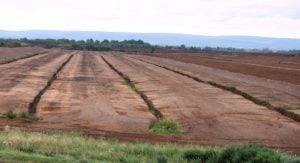The facts are incontrovertible, the consequences are devastating, and the alternatives are effective and easily available – so the continued use of peat compost brings shame on us all.
This could end up being one of the most ill-tempered, unforgiving and shame-flinging pieces I have ever written. I’m not happy about it, but it must be done. My goal is to prise open the ever-tightening grip that denial, misinformation and downright can’t-be-botheredness have on our gardening world. Gardeners, gardening organisations of every hue, gardening celebrities (A- to Z-list), the gardening media and the ‘gardening industry’ all deserve a kick up the backside for the respective parts they’re playing in the unprecedented ecological upheaval being experienced by our natural world.
My apologies to anyone I’ve overlooked that needs a booting – and a high five to everyone who’s doing what they can to change things for the better. And no, I haven’t excused myself from a good kicking.

Just shy of a year ago, I questioned the baffling silence of us gardeners as climate chaos unfolds. I wrote of how 2015 had ‘experienced record-breaking warmth in every month so far, putting it on course to be the hottest year globally since records began (2014 currently holds that dubious honour). This August [2015] was the warmest globally since 1880, and according to the National Oceanic and Atmospheric Administration in the US, the only way is up: ‘Long-term climate change is like climbing a flight of stairs: over time you get higher and higher.’’ We’re still bounding up those stairs, faster than ever.
Last month, the World Meteorological Organisation announced that ‘2016 is on track to be the hottest year on record… June 2016 marked the 14th consecutive month of record heat for land and oceans… Another month, another record. And another. And another. Decades-long trends of climate change are reaching new climaxes.’ It doesn’t feel like ‘global warming’ here in dull, chilly Snowdonia, but anyone who reads up on climate chaos soon realises that it doesn’t work that way. If you’re a gardener and you think what’s happening to our increasingly rumbustious climate – let alone to the other life-sustaining parts of earth’s ecosystem – is nothing at all to do with you, and you find ‘unseasonal weather’ an irritation, it’s time you woke up.
Gardening can be wonderful, creative and life-affirming. It has limitless potential to mitigate our species’ effect on our living world, by offering sanctuary to hard-pressed nature – but that depends entirely on how we go about it. And yet, infected by the free-market capitalism bug (if only there was a spray for that), gardening has become a greedy, profit-obsessed beast that doesn’t think twice about liquidating nature in order to fatten itself. Hence the fug of irony around the feckless screech that ‘gardening is green!’ Give over.

Climate chaos has many interwoven causes, but is fuelled by the fact that, as human activity increases the amount of ‘greenhouse gases’ in our atmosphere, our planet continues to warm up apace. We’re already locked into change that’ll reshape life for generations to come; the urgent challenge is to stop spewing more carbon dioxide into the air, so that those who come after us don’t find life on earth wretchedly intolerable. Surely changing how we garden, if it will help to slow catastrophic global disruption, is a no-brainer? Visit any garden centre or DIY chain store, especially its compost area, and you could be forgiven for wondering whether we have any brains at all.
Despite all we know about the value of peat bogs – their unrivalled ability to lock up and store climate-changing carbon, purify water, ease flood risk – we’re still destroying them to pot up petunias. Habitat-specific wild species depend on peatlands, and some contain priceless archaeological records. Boring old peat bogs: who needs them? We all do – but not just so we can grind them into pound signs.
There are many ways to garden more ‘lightly’. Not using pesticides and weedkillers, manufactured through energy-intensive processes, largely from oil, is a fine start. A more frugal mindset is a great ‘tat-nav’ to activate when you’re in a garden centre, to help reduce demand for pointless ‘stuff’. But the most potent, climate-savvy change you can make is to not buy any sowing or potting compost containing mined peat. Even if it’s ‘peat-reduced’, buying that bag signals to the supply chain that you want more, so Big Peat mines more of it, trashing nature and setting carbon free in the process; by buying that bag, you are playing your part in stoking climate chaos. ‘Oh, but it’s just a few bags’ won’t slice any ice – instead, it is speeding its melting at the North Pole.
Nowadays, there’s no need to use peat for gardening; modern peat-free composts can grow superior plants. If you’re clinging to myths and misinformation bandied around by pro-peat gardening ‘journalists’, get yourself a bag of SylvaGrow and get with the future of growing. SylvaGrow has been awarded no less than four Which? Gardening Best Buy gongs – two of them for Best Buy container compost, two years on the trot. It’s an all-purpose mix made for professional growers that’s now available to gardeners, mostly through independent garden centres. I’ve used it for several years, as have many other gardeners, including new ones. It grows fabulous plants. You might have to nag your local garden centre to stock it, but if you can’t be bothered to ask, and they can’t be bothered to try it, shame on you both. If ‘three bags for £12’ today trumps a potentially wretched environmental tomorrow, well… shame on you.

If you’re a garden centre preoccupied more with cupcakes than climate chaos, and think stocking a few bags of an underperforming peat-free compost ticks the ‘eco’ box and grabs a few more quid, shame on you. If your excuse for stocking mountains of peat-based compost is ‘oh, but we have to give customers what they want,’ shame on you. How about getting in some top-quality peat-free, sowing and growing in it, and showing your customers the results? Responsible, responsive, educative retailing – does that sound good to you?
If you work in the gardening media and haven’t yet tried a modern peat-free compost, such as SylvaGrow, and shared the results through all the channels now at your disposal, shame on you. If you’re a magazine editor who thinks it’s clever to ridicule ‘green gardeners’ while downplaying the damage that using peat-based compost does to our natural world, just to keep big business sweet – an extra big dollop of shame for you.
If you’re the Royal Horticultural Society, with self-confessed climate change ‘wobbler’ Alan Titchmarsh as one of your Ambassadors and Vice President, shame on you for underestimating the influence that celebrities might be having, not just on your own organisation’s attitudes to climate change and our wider environment, but on us all. (If you’re scouting for a Peat-free Ambassador, I’ll chuck my name into the compost bag.) And if you’re a youngish horticultural ambassador of any sort, and you’re not taking every chance to talk about peat-free gardening and horticulture, there’s shame in the offing for you.
If you’re a trade organisation that lobbies members of parliament for reduced, more business-friendly regulation, and a continuation of peat use in the interests of ‘the economy’, shame on you. If you have no plans for a nationwide campaign to educate gardeners – through gardening retailers big and small, through the media, and by engaging trusted celebrities to hammer home a persuasive peat-free message, especially to those with no awareness of what’s actually in a ‘bag of dirt’ – shame on you. The current voluntary ‘target’ for removing peat from gardening is 2020; when does an industry-led media campaign to meet that take off? (Note to self: don’t hold your breath.)

If you’re a gardening celebrity (and you’re not wobbling on climate chaos), with ample opportunities (television, radio, online) to talk persuasively about both the back-garden and the global benefits of using ecologically sustainable peat-free composts, and you’re shying away – out of peer-fear or through self-interest – shame on you. Don’t spout about how gardeners do all sorts of good things for nature if you’re not prepared to tackle head-on the back end of gardening – the one that digs nature up. That way hypocrisy lies.
If you’re a compost manufacturer who’s hell-bent on ignoring (or simply denying) everything we know from science about climate chaos, its causes, and the urgent need to check it, and you’re giving the order to rip into and wreck yet another peat bog to turn a profit, shame, shame, shame on you. How do you sleep at night?
If, a year from now, nothing has changed, if peat compost is still stacked to the rafters in garden centres, if pro-peat myths still litter the media airwaves, if our global thermometer reading has gone up, and if none of these kicks up the backside have left their mark, then I guess it’ll be shame on me, too.
Text and images © John Walker. Peat bog image: Wikimedia Commons.
Find John on Twitter @earthFgardener


